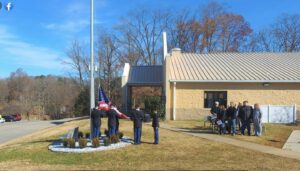Remembering 9/11: Why Knowing History is Essential
Ten years after the September 11, 2001 (9/11) attack, 97 percent of Americans over the age of seven recalled where they were when they first heard about the attack. However, like members of the…

Ten years after the September 11, 2001 (9/11) attack, 97 percent of Americans over the age of seven recalled where they were when they first heard about the attack. However, like members of the “greatest generation” who nearly all recalled where they were when they became aware of the Japanese attack on Pearl Harbor, the “9/11 generation” will pass away, and direct memory will eventually be lost.

I have the privilege of teaching at a Christian university and am reminded of this truth with every new incoming college class (the 2021 class of first-year college students were mostly born in 2003). When generations pass from the scene and actual memory of meaningful events is lost, history becomes the way we place events in context. Here are three reasons why knowing history is essential.
First, history is important to memorialize events like 9/11 because a time will come when the events stand alone without any living human memory. Establishing memorials and remembrance days is a way for future generations to learn about events and pause and reflect on the consequences, losses, and sacrifices, and how our present was shaped by the past. For those who lived the history being memorialized, the process can provide a way to cope with tragedy. For example, even amidst the American Civil War, soldiers on both sides endeavored to mark the battlefields for future generations so their suffering and loss would not be forgotten. Consequently, we create memorials and hold ceremonies to recenter and take time, if only for a moment, to reflect on our place in God’s grand historical scheme.
Second, we can learn from the past to prevent repeating mistakes or to make better decisions. A classic example of learning from the past was the difference between Allied actions at the end of World War I and World War II. At the end of World War I, the Allies imposed harsh restrictions on Germany, including reparations for damages caused by the war. The German economy was in shambles, and the emerging Weimar Republic was highly unstable, with the nation primed for a communist takeover. The unsympathetic Allies left Germany to flounder, and the German people adopted a myth that their army did not lose on the battlefield but was “stabbed in the back” by nefarious actors at home. These conditions, aided by the worldwide economic depression, contributed to the rise of the National Socialists as the ruling party in Germany in 1933 and, of course, World War II. During World War II, the Allies realized that the new war needed to end much differently than World War I. Hence, they demanded unconditional surrender and pursued the complete defeat of the German and Japanese armed forces to prevent a repeat of the “stab-in-the-back” myth.
But the United States did something very remarkable and uniquely American. Through the Marshall Plan, the U.S. helped rebuild Germany (and the rest of war-ravaged Western Europe) rather than leave them to flounder, thereby contributing to world-wide economic improvement and stability, building strong friendships, creating Cold War allies, and establishing trading partners that lasted through the ensuing decades. We learned through history to identify and correct errors and to make friends.
Third, literacy in history is an essential element to building good citizenship. Not only does history provide information that can lead to better decision-making, but a study of history can encourage critical thinking by helping us understand the longterm consequences of decisions. A study of history aids in the development of critical thinking because it encourages habits that are vital for responsible civic behavior for community leaders, citizens, and voters.
Regarding effective critical thinking, British Prime Minister Neville Chamberlain pursued a policy of appeasement during the era of German expansion prior to World War II. When Adolph Hitler threatened Czechoslovakia with invasion in 1938, several German officers organized a plot to remove Hitler from office and secretly asked the British for assistance. Mr. Chamberlain, aware of the plot, proceeded with his plan to appease Hitler and reach a settlement that ultimately resulted in the seizure of most of Czechoslovakia by Germany anyway, thereby undercutting and ending the generals’ attempt to stop Hitler. The possibility existed that if Chamberlain allowed the plot to proceed, a world war might have been avoided. Chamberlain miscalculated Hitler’s pursuit of national living space despite Hitler’s published intentions and aggressive activities such as remilitarizing the Rhineland and incorporating Austria into the Reich the same year.
In summary, reasons for studying history include appreciating the significance of past events in order to learn from them so we can think critically and function as effective citizens. President Lincoln placed history at the center of sustaining the great American project when he stated that:
if America were to fail, it would not be by foreign conquest but by suicide – due to civic ignorance about our laws and Constitution, combined with the decline in the civic virtues needed to sustain civil disagreement and civic friendship amid the diverse views in our republic.
Sources:
Carrese, P. O. (2021, August 26). Civic education as a duty and a delight. https://www.nas.org/blogs/article/civic-education-as-a-duty-and-a-delight
Panhorst, M. W. (2014). The first of our hundred battle monuments: Civil War battlefield monuments built by active-duty soldiers during the civil war. Southern Cultures, 20(4), 22-43. https://www-proquest-com.aspenuniversity.idm.oclc.org/central/docview/1633993196/fulltextPDF/9C961D3667D84D0DPQ/1?accountid=34574
Pew Research Center (2011, September 1). United in remembrance, divided over policies.https://www.pewresearch.org/politics/2011/09/01/united-in-remembrance-divided-over-policies/
Santayana, G. (2005). The life of reason. (D Widger & R. Tonsing, Eds.) Project Gutenberg. (Original work published 1905-1906). https://www.gutenberg.org/files/15000/15000-h/15000-h.htm
Shirer, W. L. (1960). The rise and fall of the Third Reich. Simon and Schuster.
Stearns, P. N. (1998). Why study history? American Historical Association. https://www.historians.org/about-aha-and-membership/aha-history-and-archives/historical-archives/why-study-history-(1998)



